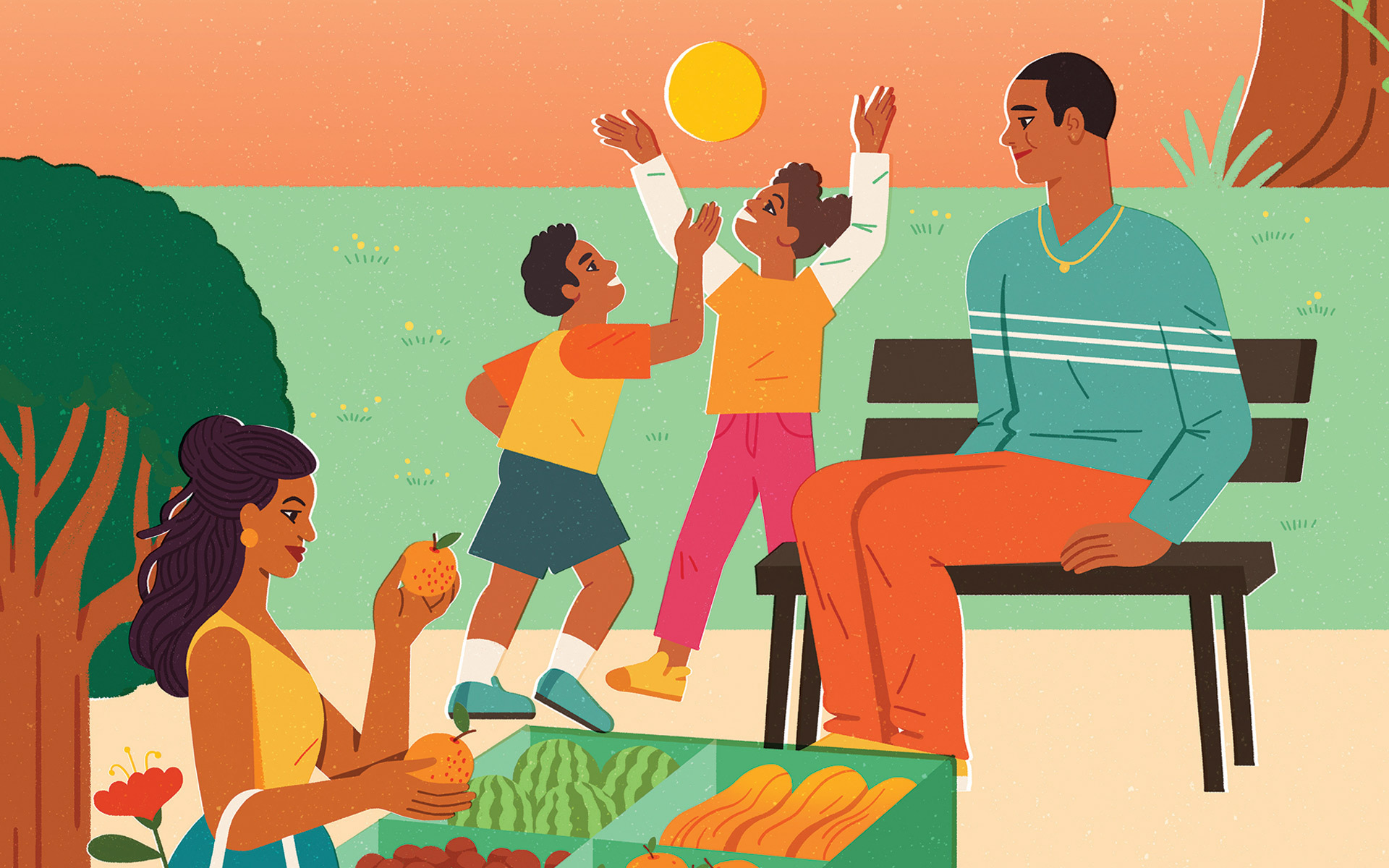On a busy road in a neighborhood in the city where I live, there was a garage door I used to give the finger to every time I passed by.
It was a pretty regular garage door in every way, except that stenciled on it, in two-foot-high letters, were the words be grateful.
Nothing got my back up like that garage door.
“What on earth are you doing,” my husband asked, the first time I broke out of our conversation to flip a door the bird.
“That garage door doesn’t get to tell me how to be,” I groused. “It’s so sanctimonious. It makes me sick.” I continued to give the door the middle finger as we passed by.
“It’s only asking you to be grateful,” he said, shaking his head, no doubt wondering who he had married.
“I’m very grateful,” I sneered. “Not that it’s any of that door’s business.”
We would repeat this scenario once a week or so for about a decade and a half, till someone else bought the house and painted over the gratitude imperative. (Now my husband gives the door the finger whenever we drive by.)
Surely gratitude is at its best when it arises naturally, rather than when we’re scolded into it.
The imperative to “be grateful” is hard to argue with (and believe me, I have tried.) Science, many world religions, mothers, common sense, and that garage door all agree that an attitude of gratitude will do you—and those around you—good in the long run. Gratitude helps us rewire our brain to feel happier, soothes our nervous system, fuels healthy habits, and increases kindness and connection within our communities. I’m not immune to this scientific evidence, nor to the persuasiveness of the role I’ve seen gratitude play in my own life, shaving the edges off bad days, hard times, and challenging moments. But surely gratitude is at its best when it arises naturally, rather than when we’re scolded into it. Be grateful for the twinge in your back from stacking wood, at least you have wood to stack, and the ability to stack it, a phrase like be grateful seems to nag, wagging its finger as it does (or is that my finger that’s wagging?).
When we harangue ourselves and others into conjuring up some half-hearted gratitude, we’re not exactly honoring the kind of awareness of the present moment that can lead to genuine feelings of gratitude. Instead, we’re positioning ourselves as luckier than some other poor sap, who’s much worse off than us and has nothing to feel grateful for (but still, probably, somehow manages to be more virtuous than we are, we lousy ingrates.) And that rarely feels good in the long run.
Gratitude finds its way to me when I’m not trying for it, when I’m not feeling guilty about it, or goaded into it, and when it’s least expected. Because the truth is, I am grateful to have wood to stack, and to be able to feel a twinge in my back after stacking it—but not because I “should” feel it.
As a writer, my practice is built on noticing. The more I incline myself toward this noticing, the more I am able to access gratitude. And so the noticing itself has become a kind of gratitude practice, one I do regularly, in spite of myself. Writing may not be part of how you engage with the world, but a practice of noticing might be your own gateway to gratitude, as it has been for me.
And so, I notice the particular blue or grey of the sky, the smell of wood smoke on the air on a damp winter day, the rustle of leaves, the bitter tang of black coffee, the soft coziness of the bright blue wool blanket a friend brought me from a trip abroad. These details, when I take the time to notice them—to truly notice the way they look, feel, smell, taste, sound, the emotion that arises in me to accompany the experience—these details anchor me in what’s really happening, and when I can pay my attention to that, gratitude arises naturally in me.
I am grateful for this body that’s breathing, for the natural richness of my experiences in the world, my ability to perceive the beauty and the fleetingness, the pain and the pleasure, the dampness and the wood smoke. And that’s something that belongs to me, and I to it, no matter what that garage door says.
—Stephanie Domet
5 Simple Gratitude Practices for Daily Life
1) Begin With Gratitude for Your Body
When we take a moment to appreciate what’s happening in our bodies right now, with a spirit of curiosity, we honor all that our bodies do for us every day.
Some days I wake up and notice that my spring has already sprung and each movement has a kind of creaking quality. After years of practicing mindfulness, it makes me smile. Whatever experience I’m having—good, bad, pleasant, unpleasant—I will never pass this way again.
This is an invitation to explore the experience of the present moment in all its gory glory. You can do this practice sitting, standing, upside down or whatever way you find the present moment.
Tap Into Gratitude for Your Body—Elaine Smookler
- Let’s start by taking three nice big breaths. Breathe in for a count of three and out for a count of five. Do you notice? You’re alive. It’s actually kind of amazing. Can you bring your attention to the jaw-dropping wonder that is the human body?
- Let’s start with the toes, bringing attention to your feet touching the ground. You may be amazed by how many sensations there are to experience: tingling, pulsing, restlessness, hot, cool, moist, dry, ticklish, itchy, numb, neutral. What do you notice about paying attention to these small experiences? Is it possible that they could help you cultivate gratitude for this body that’s going to accompany you through your life?
- As you move up the legs, what do you feel? Whenever I feel anything uncomfortable, I notice how much I want to make meaning out of it. Instead, I invite us all to just feel what’s here without ma ing any meaning of it at all. It’s all so interesting. So this is what’s happening now.
- Moving up to the land of pelvis, I notice clenching the moment I go to explore sensations in my bladder. Do I dare? Again, reminding myself that it’s not about trying to relax or make anything easier or better. I use these moments of awareness to widen the palette of colors available to experience what it is to be a human. What do you notice?
- Continuing the journey up the body, eventually we encounter the beautiful belly filled with so many stories. Loss, longing, yearning, wanting. Can you be grateful for all that it’s experienced and send it love and appreciation?
- Moving up through the torso, this luscious landscape which houses heart and lungs, you may picture an inner river pumping and flowing, bringing juicy life through the body.
- When you reach your shoulders, you can lay gentle hands on yourself, massaging some of the day’s stress away. Taking a moment to be grateful for all that our shoulders shoulder. Swooping down through arms to fingers, I thank them for allowing me to be independent in so many ways. Can you offer appreciation to your hands and arms that work so hard?
- We visit the neck and face. Are lips dry or moist? Are your teeth clenched? What about the jaw? Can you feel the air moving in and out of your nostrils? Can you notice your eyeballs, top of head, back of head, side of head, and ears?
- On an out-breath, let go of focused awareness. On an in-breath, expand your attention around the entire body, noticing all the sensations reminding you that you are alive right now. What do you notice when you bring the spirit of gratitude into every precious moment that you and your body share together?
—Elaine Smookler
2) Allow Gratitude to Connect You to All Living Things
When we awaken awe and gratitude for our interdependence, we can infuse a spirit of loving-kindness toward all beings, including ourselves.
Mindfulness, gratitude, and self-compassion help free us from isolation. These practices open our minds, awaken our hearts, and deepen our sense of connection. We begin to realize that we are never just practicing for ourselves. Transforming ourselves creates echoes in the universe: As we heal ourselves, we heal each other and our world. As Arianna Huffington puts it, “Living in a state of gratitude is the gateway to grace.”
- Begin by settling the mind and body, taking a seat on a chair, on the floor, or wherever you can sit comfortably upright. Allow a soft smile to rest on your lips, not as a way to paper over how you are feeling, but simply to invite in rest and ease.
- Bring your awareness to the simple sensations of breathing. Feel how the breath is supporting you, oxygenating the body with each inhale, releasing stress and toxins with each exhale. Begin to sense the beating of your heart. Become aware of how the heart is supporting you, sending blood carrying oxygen and nutrients to the trillions of cells in your body. Invite in a feeling of gratitude and kindness toward your breath, your heart, your body.
- Begin to feel your body in your seat, and let your awareness expand to include the Earth below you, supporting you. Allow yourself to rest into it, to feel held by the Earth. There is nothing more you need to do in this moment.
- Reflect on how this planet supports all beings equally, with gravity keeping all beings tethered to the Earth. Reflect on how this planet is connected to a solar system and a vast uni- verse. And that all things—all humans, all animals, the Earth, the sun, and the stars—are composed of the same matter, the same basic particles.
- Feel the web of life into which we are born, from which we can never fall. Feel how you are part of this web. Nothing is separate.
- Feel yourself resting with gratitude in the heart of the universe. Begin to send your good wishes to all beings, gently and silently repeating, “May all beings be peaceful. May all beings be safe and protected. May all beings be happy. May all beings be filled with love and kindness.”
- Now recognize that you are contained within the good wishes for all beings. Rest your attention once again on this being, sitting here, and direct the good wishes to yourself: “May I be peaceful. May I be safe and protected. May I be happy. May I be filled with love and kindness.”
- As you breathe in, you are breathing in this loving-kindness, and as you breathe out, you are sending loving-kindness out. May all beings dwell with peace. May the Earth dwell in peace. And close by offering: May this practice be of benefit for all beings.
—Shauna Shapiro
Excerpted from Good Morning, I Love You: Mindfulness and Self-Compassion Practices to Rewire Your Brain for Calm, Clarity, and Joy by Shauna Shapiro, PhD. Sounds True, June 2022.
3) Awaken the Flow of Gratitude in Nature
The outdoors offer gentle (and sometimes not so gentle) opportunities to be present with our sensations and our surroundings. Awaken gratitude for the Earth by going outside and noticing what arises.
Awaken the Flow of Gratitude in Nature—Georgina Miranda
Give yourself permission to be outside. Go into nature without an agenda or expectations, just to be with it and move with it. If you are struggling with stress, anxiety, depression, or sluggishness, moving outside can ignite an internal shift. Movement doesn’t have to be exercise: When you move with the intention of exercise, you quickly enter a state of doing. Mindful movement is free-flowing and allows you to enter a state of being. Try this simple practice when you’re out in nature:
- Breathe and pay attention. Bring all the attention to your breath, its rhythm, its ability to inspire a reset with each inhale and exhale. Notice the air you are breathing in, the smells, the temperature, the freshness. Let each inhale be an opportunity to connect you deeper with the nature you are in. Let each exhale be an opportunity to let go of anything you brought with you to this natural setting that is not needed in this moment.
- Breathe and feel deeper. Connected to your breath, what else do you feel? As you take each step, what flows through your body? How does the sun, wind, snow, or rain feel on your skin? What can you hear? With each breath, can you start to unite with the space you are in, versus being separate from it? Can you notice you are one with the earth, the air, the water, around you?
- Breathe and give thanks. Look around, while staying connected to your breath. Give thanks for the pause in the busyness of life and existence. Give thanks to your body for its willingness to move freely. Give thanks to this natural setting and the natural gifts from Mother Earth to you. Give thanks for this moment of well-being. Give thanks for knowing that conscious movement and this state of awareness are always available to you. Surrender. Let go and allow your body and your breath to just be in nature. Just be.
—Georgina Miranda
4) Counteract Resentment
When we cling to our ideas of what we want, and resist the way things are, we invite resentment into our lives. Gratitude invites us to let go.
To begin this gratitude practice, I’d like to start by considering one of the biggest obstacles to gratitude: resentment. We can dress up our resentment with a sophisticated storyline about how others—one, or many, or multitudes—are doing us wrong, but what it simply boils down to is being upset because we’re not getting what we want.
The world is too complex and multifaceted for us to continually get our way. It’s good to aspire for the best for ourselves and others, while nonetheless remaining committed to the journey more than the satisfaction of achieving a fixed outcome. If everyone gets their way, we can’t have a cooperative world. From time to time, we need to undercut our own perspective and see things from the other side—maybe even from all sides. Gratitude is a practice that can work with the tendency to cling to fixed outcomes and to feel resentful when we don’t get our way.
Counteract Resentment—Barry Boyce
- Bring to mind something that seems unlikely to change, that you do not accept. Perhaps it’s something that’s happened to you, or it’s something that’s going on with a loved one or in the world at large.
- Counter-intuitively say thank you for that. You’re not being thankful for the thing itself, you’re being thankful for the opportunity to let go. To accept how things unfold doesn’t mean we condone bad behavior or indulge in pessimism or martyrdom. The point is to use gratitude to undercut our resistance to working creatively with difficulties.
- For about three minutes, keep imagining things you resent, that you’re irritated about, that you have trouble accepting or allowing. Try having an attitude of, “Thank you for the opportunity to work with this.” Deep gratitude for the opportunity to let go of our grasping to Counteract Resentment outcomes can foster a kind of embryonic openness that can lead to other more outward kinds of gratitude.
- Next, be grateful in concentric circles, moving out from your immediate situation, with prompts like: I’m grateful to have the necessities of life. I’m grateful to have people to love and to share love with. I’m grateful for friends and companionship. I’m grateful for the people who pick up the garbage, take care of the roads, or fix my bicycle. I’m grateful for those who maintain the vast infrastructure that supports society and life. Thank you to the people who sell me food. I’m grateful to healthcare workers, and to all people dedicated to keeping me safe. Finally, I’m grateful for the need to encounter those who mean harm, who are tormented by mental and physical pain that causes them to act badly or even violently. While I do not condone purposefully harmful actions, I’m grateful that there is a spark of compassion available for those who do harm, and for all of us when we do harm, and the possibility of beneficial change emerging in time.
—Barry Boyce
5) Nurture a Felt Sense of Gratitude
This somatic (embodied awareness) practice offers a gentle way to connect with your body, while nurturing a felt sense of loving-kindness and gratitude.
In this practice, we will be connecting ideas and thoughts with bodily sensations. I’ll walk you through all of it. Follow along and do what works for you.
Nurture a Felt Sense of Gratitude—Gina Rollo White
- Begin by choosing a posture that’s comfortable for you: standing, sitting, or lying down. Allow your gaze to be soft. Take a nice big inhale, and then exhale slowly.
- Notice the length and strength of your body. Whatever posture you are in, just notice your feet all the way up to the top of your head. Bring to mind this idea of length, and also the idea of strength and pride. Feel yourself, standing tall or lengthening long, and connect with the sensation of your feet all the way up to the top of your head, so the entire length of your body is connected with the idea of strength and pride and length.
- Now we’ll move to the back of the body, connecting with the past. See if you can imagine what the back of your body looks like—the back of your head, your back, your seat, the back of your feet— and connect that with the idea of the past. Imagine that everything that’s behind you, your entire past, is connected with the backs of your shoulder blades, your seat. Maybe you can notice the space in between your shirt and your body, or the space in between your shoulder blades. Just bring to mind the back of your body, and connect it with the past. This somatic (embodied awareness) practice offers a gentle way to connect with your body, while nurturing a felt sense of loving-kindness and gratitude.
- Next, we move to the sides of our body, connecting with community. Bring your attention to the sides of your body, from shoulder to shoulder, hip to hip, the outer edges of your feet, maybe ear to ear. Imagine that these parts of your body are connecting with the outside world, connecting with community. If you can, maybe raise your arms up and create a little circle around yourself. Connect with the idea of protecting yourself, so you can create boundaries. Then, if you can, open up and reach your arms really wide, reaching out to your community. Notice how you can reach really far and feel connected with those around you, but also create the safety of boundaries, by connecting with the sides of your body, your shoulders, your hips, the outside of your feet.
- Take a moment to continue connecting with community by sending thoughts of love and kindness and gratitude to others. Bring to mind someone or something (maybe a pet) that you have an uncomplicated relationship with, who you feel safe with. As you bring to mind this being that creates safety, silently send these words to them: May you feel love and kindness. May you feel safe and secure. May you feel healthy and strong.
- And now, broaden those thoughts of loving-kindness to your inner circle or your local community or neighborhood. Bringing to mind your community, send thoughts of love and gratitude: May you feel love and kindness. Imagining all those people. May you feel safe and secure.
- Continue opening your arms as you open up your circle of love and gratitude. Feel your arms widen even more, as you move on to sending well-wishes to your nation. Imagine all the people and beings on your continent, and then even further out, in the entire world: May you all feel love and kindness. May everyone, every being, every animal feel safe and secure. May you all feel healthy and strong.
- And now, bring your arms in closer to your body. Making that circle smaller and smaller, you can come back to your neighborhood, your community, all the way back to that first person or animal that makes you feel safe and secure. Connect once more with the outsides of your body, the outside of your feet, your hips and shoulders.
- Now, sense into your internal world. What’s occurring inside your body? Get curious about your heartbeat, your stomach digesting, your lungs as you inhale and exhale. Connect these with the idea of present-moment awareness. What’s occurring right now, in this moment? Your breath. Your heartbeat. And also yourself, connecting your awareness with all that you are. Take a moment to send yourself gratitude, love, and kindness. If it’s available to you, put your hands over your heart.
- Think to yourself as you’re standing here in this present moment: May I feel love and kindness. May I feel safe and secure. May I be healthy and strong. May I be happy. Place your hands by your side, and once again move your attention from the internal to the external. From the front of your body, the tips of your toes to your belly, to the outside of your chest, the outside of your shoulders, your face. Connect the front of your body with the idea of forward movement, with the idea of all that is before you.
- Picture your entire body, connecting all the parts. The front of your body, the sides of your body, the back of your body, internal head to toe. Bringing it all into one thought, one image, and take a moment to send yourself some gratitude. You might say to yourself, “Great job. Great job for practicing today.” Maybe even put your hands over your heart again and saying, “Thank you.” Place your arms by your sides.
- Now, if you can, reach your arms up really high, all the way over your head. As you exhale, slowly lower your arms. If your eyes were closed, you can open them. Just take a moment to look around and take in the colors, the sights, maybe even the sounds.
- Get curious about what you feel. What is the quality you feel right now? And as you close this practice, give yourself one final moment of gratitude, saying to yourself once more, “Thank you. Great job.”
—Gina Rollo White
Read More
Finding Joy in the Mundane Moments of Life
What happens when we look for the sublime in mundane tasks? Here are five ways to capture the beauty and connection available in even the most basic daily experiences.
Read More
A Mindful Guide to Navigating Difficult Emotions
World-renowned meditation teachers and researchers describe why courageously turning toward and meeting difficult emotions with kind awareness and self-compassion is so transformational.
Read More
A 12-Minute Meditation to Nurture a Felt Sense of Gratitude
This somatic (embodied awareness) practice offers a gentle way to connect with each area of your body, while nurturing a felt sense of loving-kindness and gratitude.
Read More






